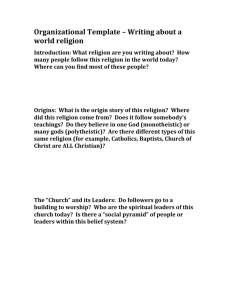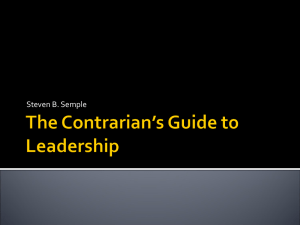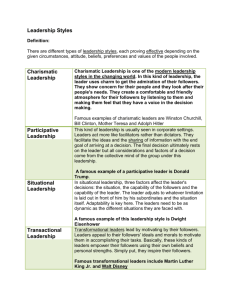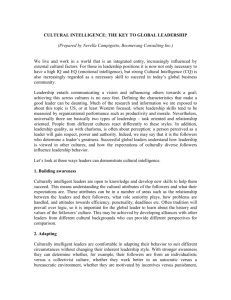Philosophies Review Sheet
advertisement
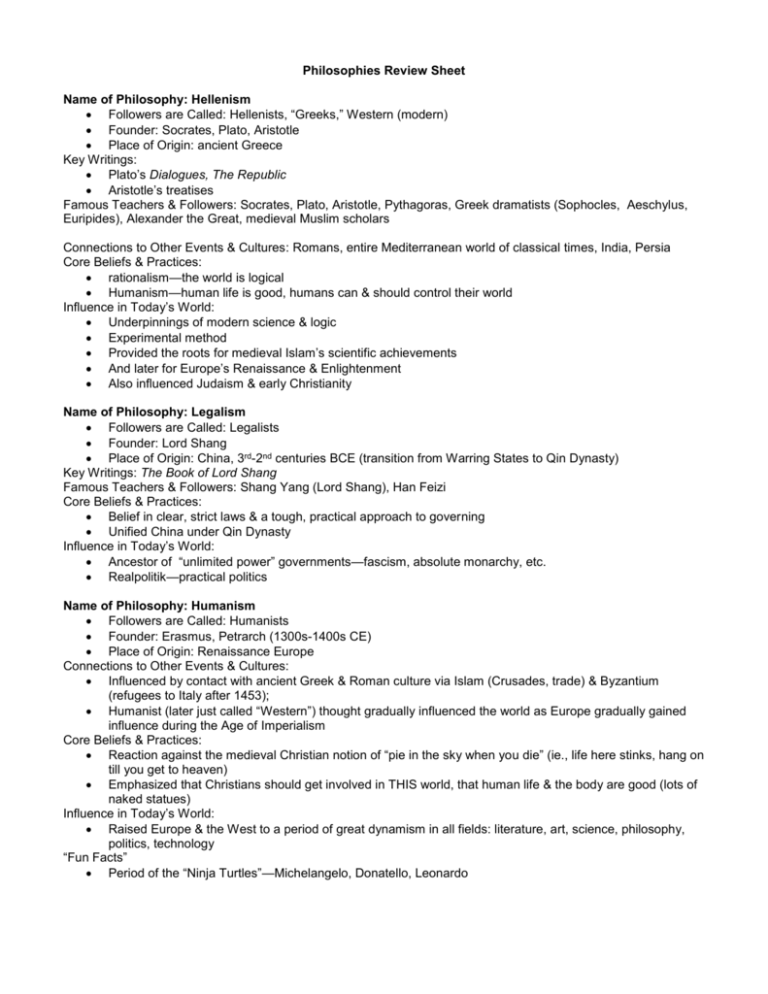
Philosophies Review Sheet Name of Philosophy: Hellenism Followers are Called: Hellenists, “Greeks,” Western (modern) Founder: Socrates, Plato, Aristotle Place of Origin: ancient Greece Key Writings: Plato’s Dialogues, The Republic Aristotle’s treatises Famous Teachers & Followers: Socrates, Plato, Aristotle, Pythagoras, Greek dramatists (Sophocles, Aeschylus, Euripides), Alexander the Great, medieval Muslim scholars Connections to Other Events & Cultures: Romans, entire Mediterranean world of classical times, India, Persia Core Beliefs & Practices: rationalism—the world is logical Humanism—human life is good, humans can & should control their world Influence in Today’s World: Underpinnings of modern science & logic Experimental method Provided the roots for medieval Islam’s scientific achievements And later for Europe’s Renaissance & Enlightenment Also influenced Judaism & early Christianity Name of Philosophy: Legalism Followers are Called: Legalists Founder: Lord Shang Place of Origin: China, 3rd-2nd centuries BCE (transition from Warring States to Qin Dynasty) Key Writings: The Book of Lord Shang Famous Teachers & Followers: Shang Yang (Lord Shang), Han Feizi Core Beliefs & Practices: Belief in clear, strict laws & a tough, practical approach to governing Unified China under Qin Dynasty Influence in Today’s World: Ancestor of “unlimited power” governments—fascism, absolute monarchy, etc. Realpolitik—practical politics Name of Philosophy: Humanism Followers are Called: Humanists Founder: Erasmus, Petrarch (1300s-1400s CE) Place of Origin: Renaissance Europe Connections to Other Events & Cultures: Influenced by contact with ancient Greek & Roman culture via Islam (Crusades, trade) & Byzantium (refugees to Italy after 1453); Humanist (later just called “Western”) thought gradually influenced the world as Europe gradually gained influence during the Age of Imperialism Core Beliefs & Practices: Reaction against the medieval Christian notion of “pie in the sky when you die” (ie., life here stinks, hang on till you get to heaven) Emphasized that Christians should get involved in THIS world, that human life & the body are good (lots of naked statues) Influence in Today’s World: Raised Europe & the West to a period of great dynamism in all fields: literature, art, science, philosophy, politics, technology “Fun Facts” Period of the “Ninja Turtles”—Michelangelo, Donatello, Leonardo Name of Philosophy: Enlightenment Followers are Called: philosophes Place of Origin: Europe, 1600s-1700s CE (sequel to Renaissance), especially France Key Writings: Locke’s Two Treatises on Government Hobbes’ Leviathan Voltaire’s Candide Pascal’s Thoughts, Smith’s Wealth of Nations Famous Teachers & Followers: Hobbes, Locke, Montesquieu, Pascal, Descartes, Voltaire, Bacon, Newton, Adam Smith, Copernicus, Galileo Key Terms: Natural Law—there is order in the universe, & people should discover & live by it Deism—God as clockmaker, who made the universe according to knowable, rational laws Enlightened Despots—Rulers try to bring their kingdoms into line with this new thinking (Frederick the Great of Prussia, Catherine the Great of Russia) Influence in Today’s World: Bacon mapped out scientific method, foundation of modern science Newton pioneered modern math & physics Locke’s concepts—natural rights, government by consent of the governed—are the foundation for democracy (American & French Revolutions) Name of Philosophy: Capitalism (aka free enterprise, free market) Followers are Called: capitalists Founder: developed gradually in early modern Europe, 1300s—1800s Place of Origin: western Europe, United States Key Writings: Adam Smith’s Wealth of Nations, 1776 Famous Teachers & Followers: United States, Alexander Hamilton, John Maynard Keynes (1930s) Connections to Other Events & Cultures: Philosophical underpinning of Industrial Revolution & Western prosperity Supported by Protestant “work ethic”—work is good Enlightenment: based on “natural laws” of economics (supply & demand) Key Terms: laissez-faire—government should not interfere with business Invisible Hand—market forces (supply & demand) do a better job of governing the economy than the government’s “Visible Hand” Core Beliefs & Practices: Competition in a free market is good for everyone: Consumers get more, better, cheaper products Businesses must be efficient and modern There is incentive to work hard Free markets are fair—hard work & creativity are rewarded Influence in Today’s World: Globalism is sort of capitalism written large—global free trade “Fun Facts” Adam Smith’s Wealth of Nations was published in 1776, and the U.S. was the first nation to embrace Smith’s economic ideas fully—they were seen as “economic democracy” Name of Philosophy: Socialism Followers are Called: socialists Founder: Robert Owen, Charles Fourier, 1830s Place of Origin: England & France Famous Teachers & Followers: “Utopian Socialists”—ideal communities where people cooperate Connections to Other Events & Cultures: Influenced modern “welfare states”—government programs for the poor, handicapped, etc. Core Beliefs & Practices: Government should insure a good life for everyone (sort of the opposite of capitalism) Influence in Today’s World: All modern economies have some elements of socialism: Social Security, welfare, health care programs Name of Philosophy: Communism Followers are Called: Marxists, Communists, Bolsheviks (Russia) Founder: Karl Marx, 1840s, assisted by Friedrich Engels Place of Origin: Germany Key Writings: The Communist Manifesto (1848), Das Kapital (Capital) Famous Teachers & Followers: Marx, Engels, Lenin, Stalin, Mao Zedong, Fidel Castro, Leon Trotsky Subdivisions: Soviet Communism (aka Marxism-Leninism, based on urban proletariat) Chinese Communism (based on peasants) Connections to Other Events & Cultures: infl. many Third World “liberation” movements during decolonization Key Terms: proletariat—the “working class” “Dictatorship of the proletariat”—Communist leaders should seize control of society & lead it towards the communist ideal Stalinism, Maoism—particular brands of Communism after these leaders Purges—Stalin’s elimination of rivals within the party Core Beliefs & Practices: Dialectical materialism—Progress occurs through struggle; there is no God, religion is a force for repression Economics is what counts—workers should seize the means of production (factories) Influence in Today’s World: Largely discredited because of failed economics (no freedom or incentive), human rights violations (no limits on power, no elections) “Communist Dream” inspired many revolutionary movements (Vietnam, Cuba, Africa) “Fun Facts” In his incendiary Communist Manifesto, Marx famously wrote “Workers of the world, unite! The proletariat has nothing to lose but its chains.” A later Soviet joke paraphrased, “The proletariat has nothing to lose but its spare change.” Name of Philosophy: Fascism Followers are Called: fascists, Nazis (Germany) Founder: Benito Mussolini Place of Origin: Italy, 1920s Key Writings: Mein Kampf (Hitler, 1924) Famous Teachers & Followers: Mussolini, Hitler, Franco (Spain), Japanese militarists Connections to Other Events & Cultures: took advantage of Great Depression to come to power in many industrialized countries in the 1930s, when democracy looked weak Aggressive policies led to WW II Core Beliefs & Practices: Extreme nationalism & racism Militarism Power is what counts—get it however you can, keep it, expand it (very harsh philosophy) Influence in Today’s World: Echoes in modern military regimes, like Saddam’s Discredited after World War Two & the Holocaust Neo-Nazis & white supremacists a fringe reaction to foreigners—Oklahoma City bombing “Fun Facts” Fascists like goofy parades, uniforms, torchlight rituals, Wagner operas, & goosestepping marches Name of Philosophy: Liberalism (aka liberal democracy) Followers are Called: liberals Founder: John Stuart Mill Place of Origin: England, 1800s; roots in revolutionary France, U.S. Key Writings: Mill’s On Liberty Famous Teachers & Followers: Thomas Jefferson—“classical liberalism,” FDR, LBJ, Martin Luther King, Jr. Core Beliefs & Practices: Human freedom is a basic good (worked against slavery, for women’s rights) Liberal democracy the best system of government Ideas contained in Bill of Rights Influence in Today’s World: Widely accepted and growing “Change is good”—informal liberal slogan Liberals usually have a lot of faith in human nature and believe in progress Name of Philosophy: Conservatism Followers are Called: Conservatives Founder: Edmund Burke Place of Origin: Britain, late 1700s Key Writings: Burke’s writings Famous Teachers & Followers: Alexander Hamilton, Thomas Jefferson, Winston Churchill, Ronald Reagan, Margaret Thatcher, Pope John Paul II, Rush Limbaugh Core Beliefs & Practices: There are certain unchanging principles that govern human affairs: Politics: democracy (in the west), human rights Morality: The family “Fun Facts” - “Don’t throw out the baby with the bath”—conservatives are typically cautious of change, worried things might go from bad to worse Miscellaneous Both liberals & conservatives have roots in the Enlightenment—different emphases Many people are liberal in some areas & conservative in others Both terms, liberal & conservative, change in meaning depending on the culture; for example, a conservative in the USSR in the 1980s meant a strict Communist, while a conservative in the US at the same time meant an anti-Communist! Name of Philosophy: Nationalism Followers are Called: Nationalists Place of Origin: early modern Europe, 1600s-1900, with precursors back to the dawn of organized society Famous Teachers & Followers: Wagner (the opera composer), Hitler, Mussolini, and everyone who’s ever appealed to patriotism with the general approach: “We French/Germans/Serbs (your nation here) are the best” Subdivisions: Russian nationalism, Serbian nationalism, Chinese nationalism, etc. Connections to Other Events & Cultures: MANY important ones! Nationalists don’t always work & play well with other cultures: Germans over here, Poles over there, Frenchmen keep your distance, etc. Nationalism is often blamed for causing wars between nations and between rival national groups within country borders. On the other hand, nationalism is often credited with fueling pro-independence movements of all sorts, especially from the 19th century onwards: Arabs and Greeks from the Ottomans, Poles from the Russians, Czechs, Serbs & Rumanians from the Austro-Hungarian Empire, Vietnamese from France, etc. Finally, nationalism has often been connected with any of the whole range of political systems, from fascism to democracy to dictatorship to communism, in its efforts to promote national power and/or pride and/or independence. Key Terms/Core Beliefs & Practices: Volkgeist—“Spirit of the people”—a nation (the Cherokee, Irish, Germans, whoever) have a certain national character that makes them unique & special Language, food, and ethnic traditions are important Influence in Today’s World: While much weaker after WW II and the demise of fascism, nationalism still has strong appeal, especially in cultures and nations that have been downtrodden—people want their ethnic pride! Name of Philosophy: Imperialism Followers are Called: Imperialists Founder: NA Place of Origin: Europe, late 1700s and especially 1800s to WW II Key Writings: Kipling’s “White Man’s Burden” Famous Teachers & Followers: Winston Churchill, Cecil Rhodes, David Lloyd George, David Livingstone, King Leopold II of Belgium Connections to Other Events & Cultures: Conquered (aka subject) peoples were typically treated as inferior culturally, racially and intellectually Key Terms: “La mission civilisatrice” (French)—“the civilizing mission”: White Christian Europeans have a duty to civilize the rest of the world Core Beliefs & Practices: Building empires Influence in Today’s World: We continue to deal with leftover problems from Europe’s imperial days: resentment of the West and everything associated with it in the developing world, and economic difficulties stemming from imperialist domination of colonial economies European languages (English, French, Spanish) are widely spoken in their former colonies Infrastructure (rail, canals, telegraph, telephone, some governmental agencies) built by the colonizers are still in use (cf. India’s railroads) Christian missionaries spread both their faith as well as education Name of Philosophy: Social Darwinism Followers are Called: Social Darwinists Founder: Herbert Spenser Place of Origin: Britain, late 1800s Key Writings: Famous Teachers & Followers: Herbert Spenser, Andrew Carnegie and most of the “robber barons” (at least to a point), many Fascist philosophers, Nietzsche Connections to Other Events & Cultures: Provides scientific underpinning for the whole “Master Race” philosophy: we rule, you drool because we’re more evolved, therefore you should die (and we’ll help you do it!) Social Darwinism has justified many harsh measures by governments in the late 19 th & early 20th centuries Core Beliefs & Practices: Darwin’s theory of “survival of the fittest” and the laws of competition should be applied to human society The weak falling to the wayside may be harsh, but it’s nature’s way of making humanity stronger; programs to help the less fortunate are a waste of money; if people can’t it together, too bad for them—the “Law of the Jungle” (Eat or be eaten) Influence in Today’s World: While Social Darwinism as an official government approach has been largely discredited after the horrors of the Holocaust, elements of it clearly survive in folk wisdom, the business world, and other places “Fun Facts” Social Darwinist founder Herbert Spenser is buried right near Communist founder Karl Marx in London’s Highgate Cemetery—one could argue they deserve each other! Name of Philosophy: Existentialism Followers are Called: Existentialists Founder: Soren Kierkegaard Place of Origin: 19th & 20th Century Europe Famous Teachers & Followers: Albert Camus (French), Jean Paul Sartre Subdivisions: Christian Atheistic Agnostic Core Beliefs & Practices: The individual must make sense of the world for him- or herself, without the aid of pre-existing religions or philosophies Sort of a “rugged individualist” approach Rejection of the western rationalist tradition
